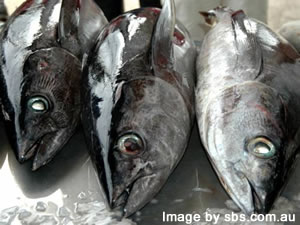
Million ton tuna take "sustainable"
Thursday 16 August 2012

Million ton tuna take "sustainable"

News that a massive new tuna cannery will soon open in Papua New Guinea and process 380 metric tons of tuna a day has led to Federal Member for Leichhardt Warren Entsch to call for Far North Queensland to get its share.
The National newspaper reported on Monday that Majestic Seafoods will open its new cannery, near Lae in Eastern PNG, in the next two months. Majestic is made up of three major Filipino and Thai owned companies, and once fully operational will employ 6000 workers.
“PNG currently catches more than one million tons of tuna a year, and the Solomon Islands and New Caledonia take around 1.3 million tons from the vastness of the Coral Sea," Mr Entsch said.
"Our take last year from our portion of the Coral Sea – due to regulation and forced closures – was 300 tons, which cost our sole commercial operator in Cairns $140,000 in licensing fees.
NEWS ARTICLE: Star rater "tunnel visioned"
“It’s absolutely ludicrous – these huge schools of tuna travel from Australian waters into the PNG section, where they will then be caught and processed for export to the European Union, USA, Middle East and Japan."
Asked if he believed PNG's one million ton take was sustainable, Mr Entsch said "I can't answer that question except to say, from what I can understand, the actual take in that total zone is still considered to be sustainable.
"What we should be doing, if we're serious about conservation, is opening up dialogue with these countries and saying 'let's work out a way we can have a joint management arrangement' so we can ascertain what is sustainable in relation to volumes, and let's fairly share those volumes.
"In doing so we may be able to encourage those other countries that are involved in the Coral Sea harvest to start to use some of the things our fishermen are using in relation to turtle excluders (and) minimising the catching of sea birds."
Mr Entsch admitted PNG and New Caledonia would not have undertaken the level of research as Australia would perform to determine what level of tuna fishing would be sustainable.
"Certainly nowhere near the the extent that we (Australia) have. We are recognised as being one of the best marine managers in the world. Let's share that expertise...but in doing so let's look at taking our fair share in that sustainable harvest."
Andrew Picone, acting Northern Australia Program Manager for the Australian Conservation Foundation, said the the size of the tuna takes in other countries in the region made the marine park in the Coral Sea a necessity.
“Increased commercial operations in neighbouring waters is a primary reason to establish protected areas in Australia’s portion of the Coral Sea.
“If there is the possibility of species being overfished in adjacent oceans it makes Australia’s protected areas all the more important," Mr Picone said.
“Scientific research shows there are strong causal links between marine reserves and the subsequent recovery of ocean life and its spill over into fished areas.
“The Gillard Government’s proposal for a network of marine reserves completes a process begun by the Howard Government in 1998.
“The Coral Sea is an integral part of the national marine reserve network.”
Mr Entsch said he had been “blown away” by the response to a petition being put to the Federal Government to halt the marine park process, with almost 5500 signatures collected in two and a half weeks from around North Queensland.
“I would like to make special mention of the Port Douglas Waterfront Protection Association. They spent hours at boat ramps, the Port Douglas markets and outside local supermarkets with the result that they gathered 1500 signatures from a town of just 4000 people.
Cheap, easy, and long lasting - check out The Newsport Classifieds
